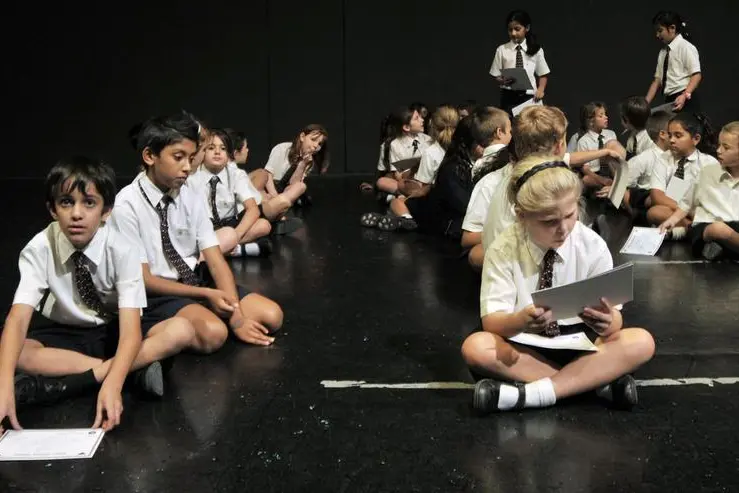PHOTO
Monday, Sep 26, 2016
Dubai: More than 200 Dubai teachers from 15 private schools are expected to participate in a pilot project, part of government efforts to introduce a mandatory teacher’s licence in the UAE.
The announcement came on Monday by the Knowledge and Human Development Authority (KHDA) in Dubai, following a similar development in Abu Dhabi last week, involving 400 teachers in the capital.
There is currently no federal or local teacher’s licence in the UAE.
The National Qualifications Authority (NQA) has said the Teacher and Educational Leadership Standards (TELS) and Licensing project aims to meet targets of the UAE National Agenda, aligned to UAE Vision 2021.
It is understood the licensing process is expected to become mandatory for all teachers from September 2017, until the process is completed in phases to ensure all teachers have a UAE teacher’s licence.
Dubai’s pilot project is being rolled out in 15 private schools and is expected to end in January 2017.
‘Professional standards’
Dr Thani Al Mehairi, NQA director-general said the licensing project “will lead to a higher quality of teaching which is based on professional standards and guarantees minimum knowledge and skills associated with teaching”.
‘TELSUAE’ has been developed by education regulators in the UAE to ensure teachers at different career stages can demonstrate professional competence and provide “first-rate” teaching and learning for learners across the UAE.
Teacher licensing will be overseen across the UAE by the NQA and the Ministry of Education, in coordination with Abu Dhabi Education Council, KHDA and other relevant entities.
Dr Al Mehairi added: “The project will adopt a specific career path for education licensing which includes the undertaking of modules to meet licensing requirements. The renewal will be based on performance assessment and professional development requirements which will lead to the development of a clear professional path for teachers.”
Dr Abdullah Al Karam, KHDA director-general, said the project also represents “a good opportunity for the UAE to produce a teacher licensing system which can work as a global tool. By working with diverse curriculums, this project will present itself as a valuable opportunity for teachers to improve their skills in line with international standards.”
Provisional licence
Dr Naji Al Mahdi, KHDA’s chief of qualifications and awards, said the project’s implementation will be spread over three stages. In the first stage, teachers will apply for a Provisional Licence. Teachers who meet the “initial requirements” will receive the provisional licence. Details of those requirements were not immediately available from the KHDA.
The second stage will involve self-assessment and training. In the third stage, teachers will take a TELSUAE exam to receive a “UAE-competent teacher status licence”.
In Dubai, the pilot phase is being rolled out by the KHDA, while British University in Dubai will conduct professional development, training and assessment.
Jeff Smith, director, Deira International School, said: “Professional recognition of teachers is important and it will definitely improve the social status of teachers by adding to their professionalism…”
Ruth Burke, Principal, GEMS Wellington International School, said, “Bringing a standardised approach to teaching will benefit all stakeholders and help us do the best for our students while achieving national agenda targets.”
Elisabeth Swartz, a grade five teacher at Dubai American Academy, said: “Being an effective teacher is much more than being an expert in subject matter. Student-centred teaching, establishing and maintaining professional relationships with students, promoting positive learning environments, understanding personal and professional ethics within the UAE are skills that prospective teachers will learn through this programme.”
How teacher licensing works in Dubai
Stage 1 - Application for teacher licence
Teachers submit an application for a teacher’s licence. Those who meet the initial requirements receive a provisional licence.
Stage 2 - Self-assessment and professional development
Teachers complete a self-assessment and identify training needs. Professional development training modules will be conducted and a mock exam will identify gaps in knowledge and understanding of individual teachers, following which further training will continue.
Stage 3 - TELSUAE Exam and approval of Competent Teacher Status Licence
Successful completion of TELSUAE exam will provide ‘UAE Competent Teacher Status Licence’. This licence will allow teachers to teach in all schools in the UAE.
Dubai schools participating in pilot teacher licensing project
GEMS Our Own English High School
Al Khaleej National School
GEMS Dubai American Academy
GEMS Wellington International School
The Westminster School
Al Mawakeb School, Garhoud
New World Private School
Jumeirah Baccalaureate School
Deira International School
Universal American School
Al Ittihad Private School (BR)
The Indian High School
School of Modern Skills
Al Rashid Al Saleh Private School
Swiss International Scientific School
by Faisal Masudi Staff Reporter
Gulf News 2016. All rights reserved.





















